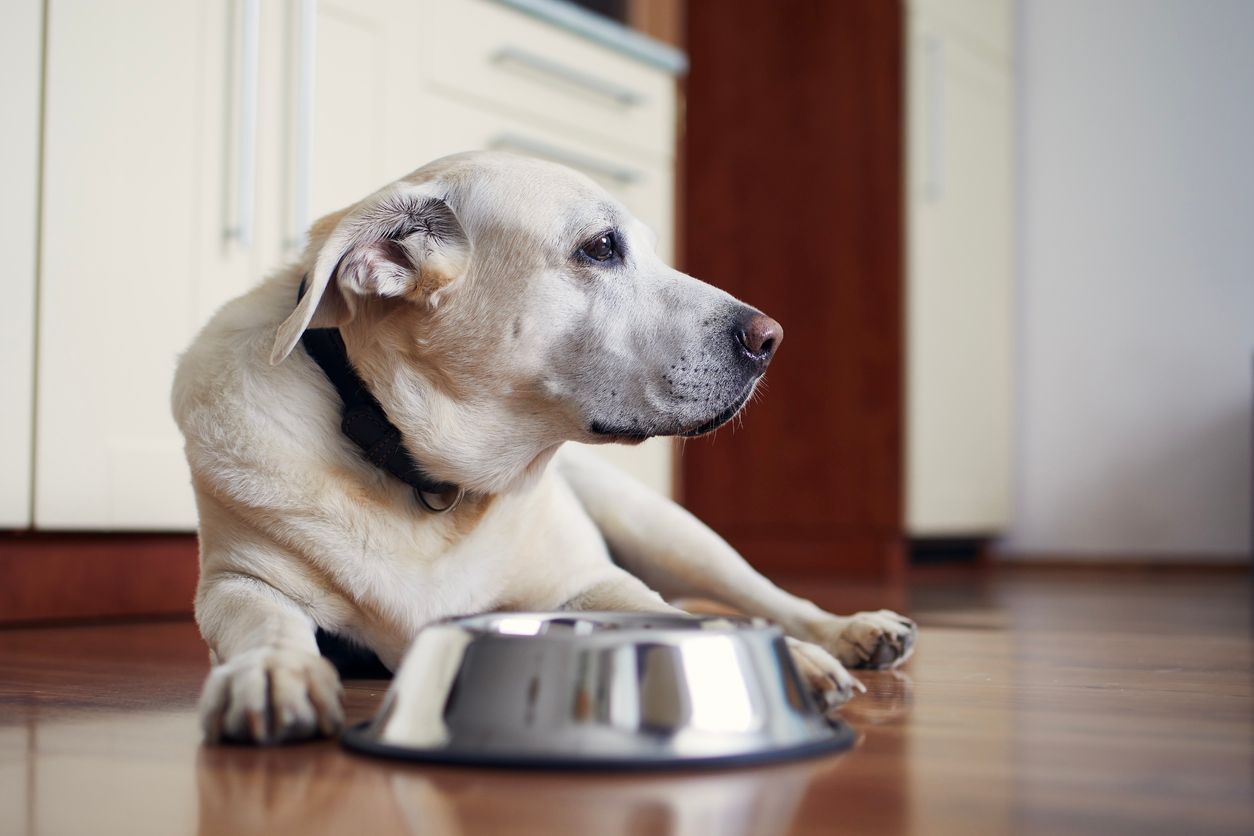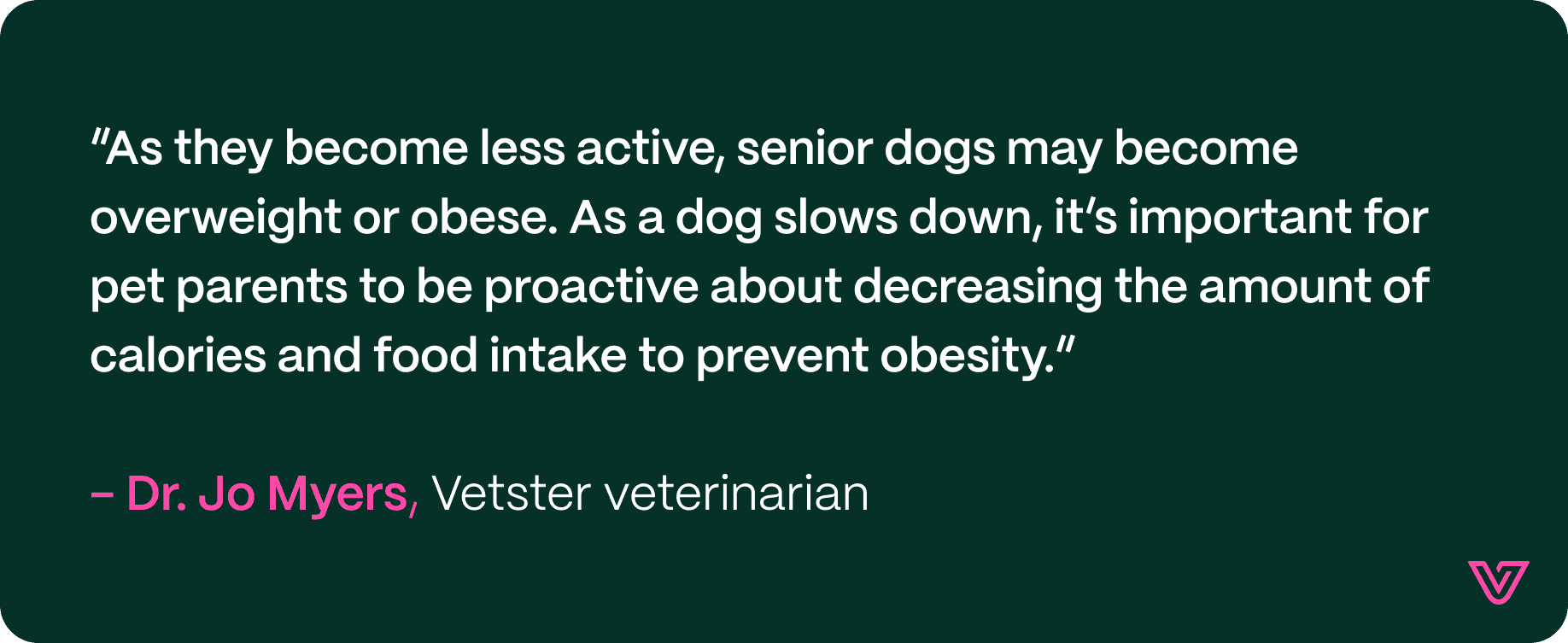What supplements or food does my senior dog need?

We all want to give our dogs a wonderful quality of life and ensure their health, especially as they move into advanced age. It’s easy to become overwhelmed in the pet food and supplements aisle trying to determine what will best support our older pups. If you have an elderly dog, read on to learn:
- Is my dog considered elderly?
- Does my senior dog need senior dog food?
- What dog food does my older dog need?
- Are senior dog supplements beneficial?
Not all senior dog supplements or pet foods are created equal, and every dog will have different needs as they grow older. Talking to a vet about senior dog health and keeping a close eye on your dog through wellness exams and testing are the best resources for choosing the perfect diet for your senior dog.
When is a dog considered a senior?
Different dog breeds, as well as individual dogs, reach maturity and are considered seniors at different ages. Giant breeds, in general, have shorter lifespans than small and medium-breed dogs. Instead of an age-based definition of a dog’s life stage, veterinarians classify dogs as senior when they are at 75% of their expected lifespan. For example, if the average life expectancy for your dog is 10 - 12 years, they will be considered senior from about the age of 8 onward. To determine what life stage your dog is at, it’s best to talk to a veterinarian.
How do nutritional needs change as dogs age?
Compared to younger adult dogs, most senior dogs need diets lower in fat and higher in protein to maintain lean body mass and reduce the risk of obesity. Dogs who become less active as they age also require fewer calories per day compared to when they were younger to maintain a healthy body condition. Senior dog supplements are not required for most dogs. As long as your dog is on a balanced diet appropriate for their individual needs, they should be getting all of the nutrition they need to stay happy and healthy.
What is the best food for my senior dog?
There is no one-size-fits-all food choice for a senior dog. The right food for an individual is based on their individual nutritional needs. This individual variance depends on multiple factors, including:
- Underlying health conditions
- Body condition
- Reproductive status
- Activity level
Foods labeled for senior dogs
There is a large market of dog food labeled for seniors. However, senior dog foods may not be necessary or better for your dog. There are no regulatory standards a diet must meet in order to be labeled for seniors. Instead, talk to a veterinarian about your dog’s medical history and nutritional requirements to pick the right kind of food.
Foods for individual age-related health concerns
While advanced age is not a disease, senior dogs are more likely to develop chronic age-related health issues as they get older. These include:
- Osteoarthritis
- Obesity
- Dental disease
- Diabetes
- Liver disease and kidney disease
- Cognitive dysfunction
If your dog develops chronic conditions as they age, their nutritional needs may change. For example, dogs with kidney disease require different nutrition than a dog with diabetes. Picky eaters who need to gain healthy weight have different needs than obese dogs. Older dogs with a dulled sense of smell or pain while recovering from treatment for dental issues may need wet food. Most importantly, know that every dog is different. A nutrition consultation with a vet is an excellent way to narrow down the right food for your dog, and routine senior wellness exams are the best way to identify medical conditions that benefit from nutritional therapy.
Foods for weight management
“As they become less active, senior dogs may become overweight or obese,” explains Dr. Jo Myers, a Vetster veterinarian. “As a dog slows down, it’s important for pet parents to be proactive about decreasing the amount of calories and food intake to prevent obesity.” There are foods that can help an overweight dog lose weight, but obesity prevention is best as it also prevents other medical conditions such as poor joint health, diabetes, and heart disease.

Senior dogs are also more likely to begin losing healthy muscle body mass. Even obese dogs who need to lose weight may have reduced muscle tone that is not immediately evident. High protein diets can help dogs at risk to keep and maintain healthy muscle tissue as well as promote healthy weight gain, lean body mass, and good body condition. When a senior dog has other conditions such as chronic kidney disease, however, a low protein diet may be recommended. Talk to a veterinarian to determine the best plan for balancing your senior dog’s complex nutritional needs.
Should I give my senior dog dietary supplements?
Some dietary supplements may appear to help aging dogs. However, unlike regulated medications, supplements are not required to undergo extensive testing to prove they are effective. Further, supplements do not have to comply with the same manufacturing standards as food and medication, which means products on the shelves may be contaminated or have undisclosed ingredients. Some dietary supplements for dogs have scientific evidence suggesting they may have health benefits. These include:
- Glucosamine and chondroitin for joint health
- Omega-3 fatty acids for healthy skin, coat health, and cognitive function
- Vitamin and mineral supplements for nutrient deficiencies caused by disease
- Probiotics for digestive disorders
Supplements are usually safe when given as directed, but even if they contain these ingredients or fall into these categories they are not always effective. There are no true quality control measures for pet supplements, including natural supplements, meaning the ingredients list might not always be accurate and can even vary from batch to batch. In addition, even if a supplement is safe for a dog to take, it may not always be necessary. Talk to a veterinarian if you have concerns about your dog’s health that you think could be helped by adding a supplement to their diet.
How do I choose the best senior dog supplements and food?
The only way to truly know your dog’s individual needs is to receive routine wellness exams and testing from a veterinarian. Senior dogs require more frequent wellness checks than younger adult dogs to keep a close eye on any changes to their health. If your canine companion requires a specific diet, supplement, or extra care, a vet can help you choose the right one.
With that being said, a place to start when shopping for dog food regardless of age is to look for an AAFCO statement of nutritional adequacy. AAFCO seals show that the food has been tested and meets the minimum nutritional requirements for healthy dogs. AAFCO is specific enough to categorize food by life stages, and healthy senior dogs should be on a formula that the AAFCO label indicates is for “all life stages” or “senior dogs.”
Pet parents often notice senior pooches seem to get more picky as they get older. Sometimes this occurs due to dulled senses of smell and taste associated with normal aging. It can also be related to pain from dental disease. Dogs with arthritis may have difficulty eating from lower food bowls and appear to be picky about their food. An elevated food bowl can help make eating more comfortable.
Some dogs become so picky that their unhealthy preferences lead to additional medical problems. It’s important to talk to a vet before assuming your dog’s changing preferences are the result of being picky. Once you have confirmed the behavior is not related to an underlying medical condition, you can confidently provide only healthy choices your aging pup enjoys.
Nutritional needs can change more quickly in seniors compared to younger mature dogs. If you have questions about your dog’s nutritional needs or if a supplement will help their health, you can talk to a vet from the comfort of your own home with a virtual vet visit.
FAQ - What food or supplements help senior dogs?
What is the best food for an elderly dog?
Start by checking the label for an AAFCO statement that says the food is nutritionally complete for dogs at “all life stages” or for “senior dogs”. Each individual elderly dog has different nutritional requirements based on their activity level, health, and weight. In addition, some senior dogs are more picky due to decreased senses of smell and taste. Senior dog foods may not be the best fit for your dog’s needs. Talk to a vet about your dog’s individual food needs and the right senior diet for them.
What do you feed a picky senior dog?
There are pet foods on the market that are more palatable to picky eaters. An older dog with a dulled sense of smell or taste may prefer wet food that has a stronger smell or taste than the dry food they enjoyed when they were younger.
What is the best senior dog supplement?
Senior dog supplements are not well regulated or researched and vary widely in terms of effectiveness. There is some evidence that certain supplements for stress, joint support, or cognitive decline can help elderly dogs. Always talk to a vet about a new supplement for your dog to ensure that it is necessary, safe, and effective.
What supplements help slow down my dog’s aging?
Aging is not a disease, and it happens to all of us, including our beloved dogs. It can be scary to see an older dog’s physical health or cognitive function decline. The best way we can support a senior dog’s quality of life is by keeping an eye on their health through wellness checks, a complete diet, safe exercise, and mental stimulation. Some joint supplements may help ease joint pain and stiffness and allow senior dogs to move a little easier. Omega-3 fatty acids can also help with poor coat and skin conditions when used alongside routine brushing and grooming.
What is the best senior dog supplement for healthy joints?
Many older dogs develop osteoarthritis or other joint conditions as they get older. There is some scientific evidence to support that supplements that contain glucosamine or chondroitin may help support healthy joints for older dogs. Always discuss senior dog supplements with a vet, as not all are safe, effective, or necessary for your dog.




